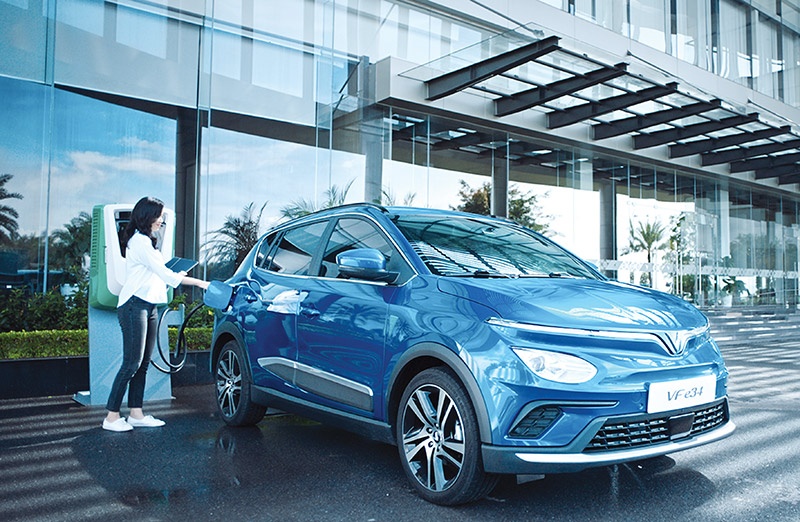VinFast stands alone in current e-car arena
 |
| VinFast has carried out another test drive campaign for its VF8 model, Le Toan |
After days of test driving sessions of the VF8, about 1,000 customers last week deposited money to buy an e-vehicle (EV) from VinFast, a member of conglomerate Vingroup. The test drive campaign is considered the most successful booking campaign in Vietnam thus far.
“The car is so strong and smooth, like being in control of a spaceship - the feeling is quite different from fossil-fuelled cars,” said Vinhomes resident Nguyen Manh Quan after testing.
Another customer, Le Xuan Trung, was happy to get his chance to test drive the VF8 after a few hours of queuing. “Driving an EV without any noise and emissions feels more civilised to me,” said Trung.
The VF8 is the second EV model that VinFast is selling on the market, with the VF e34 model having been on sale for almost two years. Despite the disruption of supply chains and the scarcity of parts over the past year, thousands of VF e34 models have been delivered to the market. In June alone, almost 800 cars were handed over to customers, the highest monthly number ever.
While VinFast is in the lead in Vietnam currently, other players look to be considering their options. In recent months, TC Group began a collaboration with Hyundai to introduce the Ioniq 5 EV with a maximum travel distance of about 450km per full charge. This model continues to take on market feedback. Hyundai’s Kia EV6 has also been designed with many engine versions.
Audi, meanwhile, is planning to introduce the E-tron GT in Vietnam after a successful launch in Thailand. The sports car has a high starting price of around $217,000.
At the end of 2021, Mercedes-Benz introduced its EQS model at an online event. This car is capable of operating up to 770km, and it takes about half an hour to charge the battery from 10 per cent to 80 per cent at a fast-charge station.
Unlike VinFast, these models are yet to go on sale in Vietnam, with the overseas car manufacturers still cautious about researching the market. Pham Tuan Anh, deputy director general of the Ministry of Industry and Trade’s Industry Agency, admitted that EVs are not too popular yet, and therefore VinFast is all on its own in manufacturing such vehicles.
The number of EVs, which can include hybrid, plug-in, battery, and fuel cell variants, in Vietnam only reached 140 cars in 2019, 900 in 2020, and more than 1,300 last year. “They are all imported cars and mostly hybrid or plug-in hybrid, with very few battery EVs,” said Tuan Anh.
Various moves by the Vietnamese government have been made in an attempt to help the country become a market of interest, besides traditional markets such as America, Europe, and China.
From the beginning of the year, Vietnam removed the registration fee rate for EVs to zero for three years. For two years thereafter, the registration fee will be only half of the amount imposed on fossil-fuel cars with the same number of seats. The special consumption tax rate for battery EVs has also been reduced to only 1-3 per cent, which took effect in March and is set to last for five years.
On July 22, Vietnam approved an action programme on the green transition and reduction of carbon and methane emissions in the transport sector, aiming to develop a green transport system in the push for net-zero emissions by 2050.
Specifically, for road transport, EVs will be manufactured, assembled, and imported to replace fossil-fuelled ones. The use of E5 petrol will be expanded, charging stations for EVs will be built, and car parks and rest stops will be built or transformed up to green standards. From 2040, Vietnam will gradually limit and stop the production, assembly, and import of gas-powered cars and motorbikes. It is hoped by 2050, Vietnam will use EVs only.
Hiroyuki Ueda, vice chairman of the Vietnam Automobile Manufacturers’ Association (VAMA) insisted that the general trends are inevitable. “Hybrids and plug-in hybrids will become popular in Vietnam because there is no need for massive charging stations. Along with the development of renewable energies, battery EVs will eventually become popular too,” said Ueda.
According to data from the International Energy Agency, global EV sales reached 6.6 million in 2021, more than double the number in 2020 and accounting for 9 per cent of total car sales worldwide.
What the stars mean:
★ Poor ★ ★ Promising ★★★ Good ★★★★ Very good ★★★★★ Exceptional
Related Contents
Latest News
More News
- Trung Nam-Sideros River consortium wins bid for LNG venture (January 30, 2026 | 11:16)
- Vietnam moves towards market-based fuel management with E10 rollout (January 30, 2026 | 11:10)
- Envision Energy, REE Group partner on 128MW wind projects (January 30, 2026 | 10:58)
- Vingroup consults on carbon credits for electric vehicle charging network (January 28, 2026 | 11:04)
- Bac Ai Pumped Storage Hydropower Plant to enter peak construction phase (January 27, 2026 | 08:00)
- ASEAN could scale up sustainable aviation fuel by 2050 (January 24, 2026 | 10:19)
- 64,000 hectares of sea allocated for offshore wind surveys (January 22, 2026 | 20:23)
- EVN secures financing for Quang Trach II LNG power plant (January 17, 2026 | 15:55)
- PC1 teams up with DENZAI on regional wind projects (January 16, 2026 | 21:18)
- Innovation and ESG practices drive green transition in the digital era (January 16, 2026 | 16:51)

 Tag:
Tag:



















 Mobile Version
Mobile Version